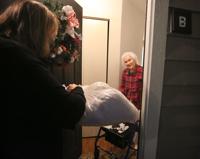Charleston-area college’s food bank saw need jump during pandemic | News
When the Phi Theta Kappa honor society at Trident Technical College started an on-campus food pantry five years ago, members didn’t understand just how much students needed it.
This year, that already substantial need at the two-year school has more than doubled, said Christine Solomon, a faculty member who oversees the program.
Running the food vault from the main North Charleston campus is far from being Solomon’s full-time job. She’s the head of the Trident Tech accounting department. That’s translated to how the operation is managed: Every item is logged in an inventory system that allows organizers to track how much food comes in and out every week.
That’s how she knows that, compared with the 2,000 pounds of food a month volunteers were giving out prior to the pandemic, they’re now distributing 4,700 pounds in the same amount of time.
Between 15 and 20 families are served weekly, along with others who drop in less often.

The very first distribution during the pandemic was huge as the health crisis abruptly upended the economy and the job market. Solomon said more than 100 people came to pick up food.
Demand slowed down over the summer, when fewer students were on campus — Trident Tech has three satellite locations — but it picked back up in the fall. Since then, it’s been pretty consistent, Solomon said.
All current students, faculty and staff can use the food vault, and the same pool of people donate to stock its shelves. Cash donations are used to buy produce through the Lowcountry Food Bank and to load up again as inventory run low.
“They’ve been more than generous filling the shelves and keeping us up and running,” Solomon said.
Along with the extra work that goes into keeping the shelves stocked since demand has doubled, Solomon and other volunteers have spent more time getting the food to people. Before the pandemic, students and staff would come to the grocery vault and pick out items themselves.
But, for most of the year, the logistics have gotten more complicated. Now, volunteers take the precaution of putting all the items together in advance and requesting curbside pickups.
Many of the students who are picking up food have similar stories: They’ve lost jobs because of the pandemic.
Some work in the struggling food-and-beverage industry and, even if they’re still employed, they aren’t working the same number of hours or pulling in as much in tips.
“We have one young lady who comes in, she works, but it’s barely enough to cover rent,” Solomon said.

While more than half of Trident’s students are 24 or younger, the people who are requesting food donations tend to skew older, said Carmela Gordon, another accounting faculty member who help runs the food vault. Some are supporting children or spouses. Solomon added that younger students who use the service often live at home and are seeking to feed entire families.
Community college students tend to face more barriers, on average, than students at four-year school. They’re more likely to be balancing classes with full-time jobs and to cite expenses, such as child care, among the challenges that could keep them from earning their degrees.
Financial setbacks during the 10-month pandemic are a likely contributor to the roughly 9 percent drop in enrollment at community colleges across the country this year, more than any other higher education sector, according to a report by the National Student Clearinghouse Research Center.
Solomon said she was “a little worried” in December because the grocery vault was going to temporarily close along with the college over the year-end break. Families were set to get three times their regular weekly distribution to help carry them through the hiatus, plus turkey or ham and the fixings for a holiday dinner.

Other area food bank options are available to the students — the grocery vault keeps a running list of them, with hours and addresses — but they’re often not as convenient.
The only requirement for the campus service is a current college email address, making it easier for people who haven’t used a food pantry before to seek out the help they need.
“We don’t ask questions,” Solomon said.
